Romeo Berti
1867 Ravenna – 1954 London
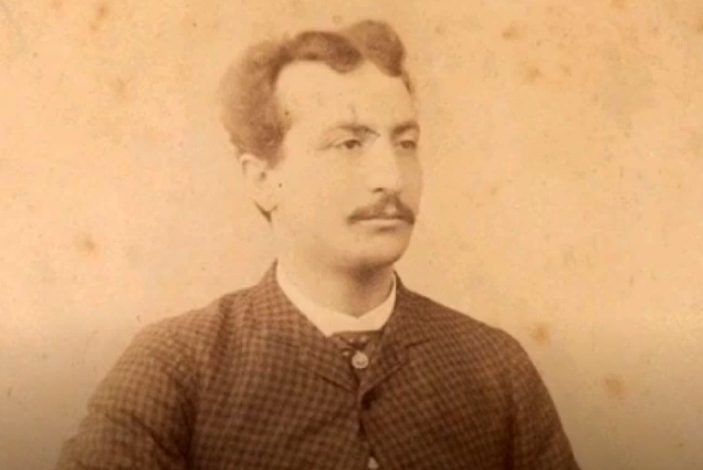
Romeo Berti is the epitome of a mystery tenor. Most everything about him is mysterious. Even the photo reproduced
above is doubtful, and I cannot vouch that it really shows Berti. Just his dates of life
are certain, and his last decades: he spent them in London, teaching voice (from 1914 onwards). One of his pupils was
Benvenuto Finelli.
As far as his beginnings, he is said to have studied in Paris with Paul Lhérie and Jean de Reszke. And he made lots of
recordings, at least 151 (see below). But nobody ever found any hint to a career. That's why collectors started very early on,
already in the 1930s, to make wild conjectures: that "Romeo Berti" was just a pseudonym of Carlo Albani. Or better still, of Jean de Reszke. (Yeah, 151 Jean de Reszke recordings! That's what
each of us would be craving, right?) Of course, not only Romeo Berti's life is largely
mysterious; it's also a mystery why so many collectors are deaf, and were deaf even back in the golden
old times. Albani??!!!? Didn't they hear that Romeo Berti was a clown singer, barely able to hold a high note without
cracking it? At least as far as de Reszke, there were, in the 1930s, enough people still alive who had heard de Reszke on
stage, and they immediately protested the idea that Berti was actually de Reszke, and testified that there was no similarity
between those two singers.
Romeo Berti's son, in a 1950s radio interview, claimed that his father had sung "at all important European theaters". This,
at least, can easily be proven wrong: he had not
sung at one single important theater, never. The history of the important theaters is documented well enough, and a Romeo
Berti is nowhere to be found.
Kutsch & Riemens wrote a funny entry about him, without really knowing much (inevitably so, nobody does), and claimed that he
had sung in provincial theaters in Italy and France, as well as in London. Well, in Italy, not so; in Roberto Marcocci's
larger-than-life performance chronologies of the provincial Italian theaters from 1870 to 1930, the name Romeo Berti does not
pop up. Not a single time. Even though even Marcocci's chronologies are certainly not 100 percent complete (but probably
95 percent), we can safely exclude that Berti ever sang in his native Italy. London is probably a deduction from his few
Nicole recordings that he made in London in 1904, without any further evidence. Which leaves us with the possibility that he
may have sung in the French provinces; I don't exclude it, since the history of the smaller opera theaters in France is so
terribly ill-documented, and since he was almost always recording and hence obviously living in France (Kutsch & Riemens say
from 1895 to 1905, for what it's worth; in fact, he recorded in Paris until 1909), and his French diction was excellent, good
enough to support another wild conjecture, that he was actually French and not Italian. But again, his career in the French
provinces is but an assumption, and not one single performance has been proven so far; he may well have been a studio tenor
only.
It's congruous with his discography, and it must have been told by his son in that radio interview: in 1910, he suffered a
voice crisis that proved definitive; so he gave up singing and, see above, moved to London to teach voice.
But actually, and here comes the best part, I found one stage appearance of Berti! In 1950, at Cambridge Theater in London,
a very successful musical revue for children was staged: "Christmas party" by Cecil Landeau; and the part of "The Tenor"
(probably a small part since he's the last of the cast) was played by – Romeo Berti! He was 83 by then! Was that perhaps
his stage debut?
Reference 1: Kutsch & Riemens, reference 2, reference 3, reference 4, reference 5: The Gramophone, September 1936
In RA format
In RA format
In RA format
In RA format
Discography
Société des Phonographes Bettini, Paris, January/February 1904
901 Manon (Massenet): Ah! fuyez 901
902 Manon (Massenet): En fermant les yeux 902
903 Pagliacci (Leoncavallo): Vesti la giubba 903
904 Faust (Gounod): Salut, demeure 904
905 Werther (Massenet): unknown selection 905
906 La forza del destino (Verdi): O tu che in seno 906
907 Ballata (Mascagni) 907
929 Mefistofele (Boito): unknown selection 929
930 Pagliacci (Leoncavallo): O Colombine 930
952 Werther (Massenet): unknown selection 952
971 Pêcheurs de perles (Bizet): Mi par d'udir ancora 971
972 Rigoletto (Verdi): La donna è mobile 972
973 Il trovatore (Verdi): Deserto sulla terra 973
991 Souvenir (Lalo) 991
992 Le rêve du prisonnier (= Zhelanie) (Rubinstein) 992
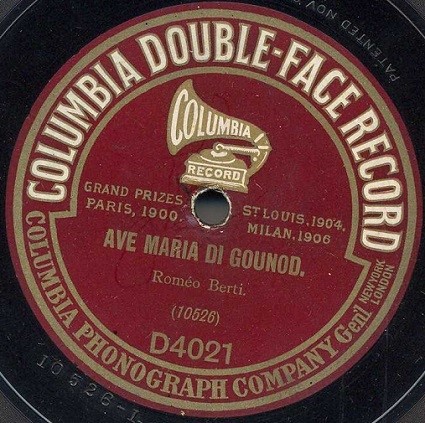 Columbia, Paris, 1904
50512-1 Sigurd (Reyer): Esprits gardiens 50512
50513-1 Jérusalem (Verdi): Je veux encore entendre 50513
Beka-Idéal, Paris, June/July 1904
7470 Les huguenots (Meyerbeer): Plus blanche 7470
7471 Pagliacci (Leoncavallo): Un tal gioco, credetemi 7471
7472 Rigoletto (Verdi) Questa o quella per me pari sono 7472
7473 Cavalleria rusticana (Mascagni) Viva il vino 7473
7474 Tosca (Puccini): unknown selection 7474
Nicole, London, summer 1904
15.. Pagliacci (Leoncavallo): Vesti la giubba 5539
15.. Cavalleria rusticana (Mascagni): O Lola 5540
15.. Carmen (Bizet): Il fior 5541
Odéon, Paris, September 1904
xP 982 Paillasse (Leoncavallo): Pauvre Paillasse X 33881
xP 983 Cavalleria rusticana (Mascagni): O Lola, blanche fleur X 33882
xP 984 Il trovatore (Verdi): Exilé sur la terre X 33883
xP 985 Tosca (Puccini): Le ciel luisait d'étoiles X 33884
xP 986 La Juive (Halévy): Rachel, quand du Seigneur X 33886
xP 987-1 Rigoletto (Verdi): Comme la plume au vent X 33887
xP 997 Pagliacci (Leoncavallo): Vesti la giubba X 37000
xP 998 Tosca (Puccini): E lucevan le stelle X 37001
Disque Excelsior, Paris, September or October 1904
296F Le roi d'Ys (Lalo): Vainement, ma bien aimée 296
Favorite, Paris, December 1904
106-b Cavalleria rusticana (Mascagni): O Lola 1-5022
107-b Pagliacci (Leoncavallo): Vesti la giubba 1-5023
Société des Phonographes Bettini, Paris, unknown date
1229 Tosca (Puccini): Recondita armonia 1229
Favorite, Paris, February 1905
370-f Werther (Massenet): Pourquoi me réveiller 1-5067
385-f Il trovatore (Verdi): Exilé sur la terre 1-5075
423-f Faust (Gounod): Laisse-moi contempler (w. Demougeot) 1-9001
424-f Faust (Gounod): Il m'aime (w. Demougeot & Carbelly) 1-9002
Tosca (Puccini): E lucevan le stelle 1-5029
Jérusalem (Verdi): Je veux encore entendre 1-5035
Le départ (Spinetti) 1-5036
Odéon, Paris, March 1905
xP 1272 Hérodiade (Massenet): Ne pouvant réprimer X 36003
xP 1273 Souvenirs (Massé) X 36022
xP 1274 Roland à Roncevaux (Mermet): Superbes Pyrérenées X 36023
xP 1282 Sigurd (Reyer): Esprits gardiens X 36017
xP 12.. Manon (Massenet): Ah! fuyez X 36030
xP 12.. Werther (Massenet): Pourquoi me réveiller X 36033
Columbia cylinders, Paris, July 1905
37193 Tosca (Puccini): Le ciel luisait d'étoiles 37193
37194 Paillasse (Leoncavallo): Pauvre Paillasse 37194
37195 Sigurd (Reyer): Esprits gardiens 37195
37196 Jérusalem (Verdi): Je veux encore entendre 37196
37197 Manon (Massenet): En fermant les yeux 37197
37198 La favorite (Donizetti): Ange si pur 37198
37199 Il trovatore (Verdi): Dieu que ma voix implore 37199
37200 Si vous n'étiez pas si jolie (Mathé) 37200
37201 Aida (Verdi): Ô céleste Aida 37201
37202 La favorite (Donizetti): Un ange, une femme inconnue 37202
37203 La bohéme(Puccini): Que cette main est froide 37203
37204 Cavalleria rusticana (Mascagni): Vive le vin qui pétille 37204
Columbia, Paris, July 1905
50695 Aida (Verdi): Ô céleste Aida 50695
50696-1 Si vous n'étiez-pas si jolie (Mathé) 50696, E494
50697-1 Manon (Massenet): En fermant les yeux 50697, E494
50698 La favorite (Donizetti): Ange si pur 50698, E495
50699 Cavalleria rusticana (Mascagni): Vive le vin qui pétille 50699
50700 La bohème (Puccini): Que cette main est froide 50700
50701-1 La favorite (Donizetti): Un ange, une femme inconnue 50701, E495
50702 Il trovatore (Verdi): Dieu que ma voix implore 50702
Edison 2-min cylinders, Paris, September 1905
B7 Pagliacci (Leoncavallo): Vesti la giubba B7
B17 Cavalleria rusticana (Mascagni): O Lola B17
B18 Rigoletto (Verdi): Questa o quella B18
B26 Tosca (Puccini): E lucevan le stelle B26
B34 Il trovatore (Verdi): Deserto sulla terra B34
Columbia, Paris, 1904
50512-1 Sigurd (Reyer): Esprits gardiens 50512
50513-1 Jérusalem (Verdi): Je veux encore entendre 50513
Beka-Idéal, Paris, June/July 1904
7470 Les huguenots (Meyerbeer): Plus blanche 7470
7471 Pagliacci (Leoncavallo): Un tal gioco, credetemi 7471
7472 Rigoletto (Verdi) Questa o quella per me pari sono 7472
7473 Cavalleria rusticana (Mascagni) Viva il vino 7473
7474 Tosca (Puccini): unknown selection 7474
Nicole, London, summer 1904
15.. Pagliacci (Leoncavallo): Vesti la giubba 5539
15.. Cavalleria rusticana (Mascagni): O Lola 5540
15.. Carmen (Bizet): Il fior 5541
Odéon, Paris, September 1904
xP 982 Paillasse (Leoncavallo): Pauvre Paillasse X 33881
xP 983 Cavalleria rusticana (Mascagni): O Lola, blanche fleur X 33882
xP 984 Il trovatore (Verdi): Exilé sur la terre X 33883
xP 985 Tosca (Puccini): Le ciel luisait d'étoiles X 33884
xP 986 La Juive (Halévy): Rachel, quand du Seigneur X 33886
xP 987-1 Rigoletto (Verdi): Comme la plume au vent X 33887
xP 997 Pagliacci (Leoncavallo): Vesti la giubba X 37000
xP 998 Tosca (Puccini): E lucevan le stelle X 37001
Disque Excelsior, Paris, September or October 1904
296F Le roi d'Ys (Lalo): Vainement, ma bien aimée 296
Favorite, Paris, December 1904
106-b Cavalleria rusticana (Mascagni): O Lola 1-5022
107-b Pagliacci (Leoncavallo): Vesti la giubba 1-5023
Société des Phonographes Bettini, Paris, unknown date
1229 Tosca (Puccini): Recondita armonia 1229
Favorite, Paris, February 1905
370-f Werther (Massenet): Pourquoi me réveiller 1-5067
385-f Il trovatore (Verdi): Exilé sur la terre 1-5075
423-f Faust (Gounod): Laisse-moi contempler (w. Demougeot) 1-9001
424-f Faust (Gounod): Il m'aime (w. Demougeot & Carbelly) 1-9002
Tosca (Puccini): E lucevan le stelle 1-5029
Jérusalem (Verdi): Je veux encore entendre 1-5035
Le départ (Spinetti) 1-5036
Odéon, Paris, March 1905
xP 1272 Hérodiade (Massenet): Ne pouvant réprimer X 36003
xP 1273 Souvenirs (Massé) X 36022
xP 1274 Roland à Roncevaux (Mermet): Superbes Pyrérenées X 36023
xP 1282 Sigurd (Reyer): Esprits gardiens X 36017
xP 12.. Manon (Massenet): Ah! fuyez X 36030
xP 12.. Werther (Massenet): Pourquoi me réveiller X 36033
Columbia cylinders, Paris, July 1905
37193 Tosca (Puccini): Le ciel luisait d'étoiles 37193
37194 Paillasse (Leoncavallo): Pauvre Paillasse 37194
37195 Sigurd (Reyer): Esprits gardiens 37195
37196 Jérusalem (Verdi): Je veux encore entendre 37196
37197 Manon (Massenet): En fermant les yeux 37197
37198 La favorite (Donizetti): Ange si pur 37198
37199 Il trovatore (Verdi): Dieu que ma voix implore 37199
37200 Si vous n'étiez pas si jolie (Mathé) 37200
37201 Aida (Verdi): Ô céleste Aida 37201
37202 La favorite (Donizetti): Un ange, une femme inconnue 37202
37203 La bohéme(Puccini): Que cette main est froide 37203
37204 Cavalleria rusticana (Mascagni): Vive le vin qui pétille 37204
Columbia, Paris, July 1905
50695 Aida (Verdi): Ô céleste Aida 50695
50696-1 Si vous n'étiez-pas si jolie (Mathé) 50696, E494
50697-1 Manon (Massenet): En fermant les yeux 50697, E494
50698 La favorite (Donizetti): Ange si pur 50698, E495
50699 Cavalleria rusticana (Mascagni): Vive le vin qui pétille 50699
50700 La bohème (Puccini): Que cette main est froide 50700
50701-1 La favorite (Donizetti): Un ange, une femme inconnue 50701, E495
50702 Il trovatore (Verdi): Dieu que ma voix implore 50702
Edison 2-min cylinders, Paris, September 1905
B7 Pagliacci (Leoncavallo): Vesti la giubba B7
B17 Cavalleria rusticana (Mascagni): O Lola B17
B18 Rigoletto (Verdi): Questa o quella B18
B26 Tosca (Puccini): E lucevan le stelle B26
B34 Il trovatore (Verdi): Deserto sulla terra B34
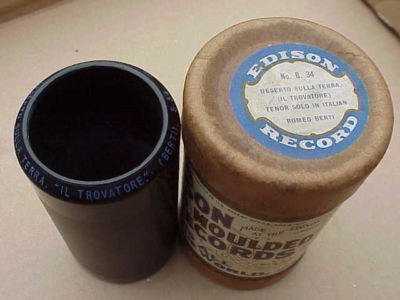 Dutreih, Paris, about 1905
165020 Andrea Chénier (Giordano): Un dì all'azzurro spazio 165020, D 15020
165021 L'elisir d'amore (Donizetti): Una furtiva lagrima 165021, D 15021
165022 Rigoletto (Verdi): Questa o quella 165022
165023 Pagliacci (Leoncavallo): Vesti la giubba 165023, D 15023
165024 Les pêcheurs de perles (Bizet): Della mia vita 165024
165025 Fedora (Giordano): Amor ti vieta 165025, D 15025
165026 Tosca (Puccini): E lucevan le stelle 165026
165027 'O sole mio (Di Capua) 165027
Disque Excelsior, Paris, 1905 or 1906
40699 Les pêcheurs de perles (Bizet): Mi par d'udir ancora 40699
40700 Cavalleria rusticana (Mascagni): O Lola 40700
40726 Otello (Verdi): Ora e per sempre addio 40726
40729 Otello (Verdi): Esultate 40729
Ballata (Mascagni) unpublished
60646 Il trovatore (Verdi): Miserere 60646
60647 Sigurd (Reyer): Grand air 60647
60648 Hérodiade (Massenet): Ne pouvant réprimer 60648
60650 La Juive (Halévy): Rachel, quand du Seigneur 60650
60682 La favorite (Donizetti): Ange si pur 60682
60683 Aida (Verdi): Ô céleste Aida 60683
Columbia, Milano, 1905 or 1906
10525-1 Tosca (Puccini): E lucevan le stelle 10525, C133, E123
10526-1 Ave Maria (Gounod) 10526, A534, D4021
10527 Andrea Chénier (Giordano): Un dì all'azzurro spazio E189
10528-1 Cavalleria rusticana (Mascagni): Viva il vino 10528, A531, C117, E438
10529-1 La favorite (Donizetti): Spirto gentil 10529, A532, D4018, E105
10530-1 Manon (Massenet): Chiudo gli occhi 10530, D4019, E109
10531 Les pêcheurs de perles (Bizet): Mi par d'udir ancora 10531, E119
10532 Falstaff (Verdi): Dal labbro il canto 10532, E101
10533-1 Lucia di Lammermoor (Donizetti): Fra poco a me ricovero 10533, C140, E112
10535-1 Rigoletto (Verdi): Parmi veder le lagrime 10535, E120, Cort F626
10536-1 Pagliacci (Leoncavallo): Vesti la giubba 10536, E118, Cort F553, T11
10537-1 Rigoletto (Verdi): Questa o quella 10537, D3032, D4011, E120, Si-La-Fa 1034
10538-1 Gioconda (Ponchielli): Cielo e mar 10538, E106, T11
10539-1 L'Africaine (Meyerbeer): O paradiso 10539, C121, D4000, E90
10540-1 Rigoletto (Verdi): Parmi veder le lagrime 10540
10541-1 L'elisir d'amore (Donizetti): Una furtiva lagrima 10541, D4004, E98, T11, Si-La-Fa 1013
10543-1 Cavalleria rusticana (Mascagni): O Lola 10543, D3047, E95, E1336, C117, T10
10544-1 Aida (Verdi): Celeste Aida 10544, D3048, E91, E1336
10562-1 Andrea Chénier (Giordano): Un dì all'azzurro spazio 10562, E189
Dutreih, Paris, about 1905
165020 Andrea Chénier (Giordano): Un dì all'azzurro spazio 165020, D 15020
165021 L'elisir d'amore (Donizetti): Una furtiva lagrima 165021, D 15021
165022 Rigoletto (Verdi): Questa o quella 165022
165023 Pagliacci (Leoncavallo): Vesti la giubba 165023, D 15023
165024 Les pêcheurs de perles (Bizet): Della mia vita 165024
165025 Fedora (Giordano): Amor ti vieta 165025, D 15025
165026 Tosca (Puccini): E lucevan le stelle 165026
165027 'O sole mio (Di Capua) 165027
Disque Excelsior, Paris, 1905 or 1906
40699 Les pêcheurs de perles (Bizet): Mi par d'udir ancora 40699
40700 Cavalleria rusticana (Mascagni): O Lola 40700
40726 Otello (Verdi): Ora e per sempre addio 40726
40729 Otello (Verdi): Esultate 40729
Ballata (Mascagni) unpublished
60646 Il trovatore (Verdi): Miserere 60646
60647 Sigurd (Reyer): Grand air 60647
60648 Hérodiade (Massenet): Ne pouvant réprimer 60648
60650 La Juive (Halévy): Rachel, quand du Seigneur 60650
60682 La favorite (Donizetti): Ange si pur 60682
60683 Aida (Verdi): Ô céleste Aida 60683
Columbia, Milano, 1905 or 1906
10525-1 Tosca (Puccini): E lucevan le stelle 10525, C133, E123
10526-1 Ave Maria (Gounod) 10526, A534, D4021
10527 Andrea Chénier (Giordano): Un dì all'azzurro spazio E189
10528-1 Cavalleria rusticana (Mascagni): Viva il vino 10528, A531, C117, E438
10529-1 La favorite (Donizetti): Spirto gentil 10529, A532, D4018, E105
10530-1 Manon (Massenet): Chiudo gli occhi 10530, D4019, E109
10531 Les pêcheurs de perles (Bizet): Mi par d'udir ancora 10531, E119
10532 Falstaff (Verdi): Dal labbro il canto 10532, E101
10533-1 Lucia di Lammermoor (Donizetti): Fra poco a me ricovero 10533, C140, E112
10535-1 Rigoletto (Verdi): Parmi veder le lagrime 10535, E120, Cort F626
10536-1 Pagliacci (Leoncavallo): Vesti la giubba 10536, E118, Cort F553, T11
10537-1 Rigoletto (Verdi): Questa o quella 10537, D3032, D4011, E120, Si-La-Fa 1034
10538-1 Gioconda (Ponchielli): Cielo e mar 10538, E106, T11
10539-1 L'Africaine (Meyerbeer): O paradiso 10539, C121, D4000, E90
10540-1 Rigoletto (Verdi): Parmi veder le lagrime 10540
10541-1 L'elisir d'amore (Donizetti): Una furtiva lagrima 10541, D4004, E98, T11, Si-La-Fa 1013
10543-1 Cavalleria rusticana (Mascagni): O Lola 10543, D3047, E95, E1336, C117, T10
10544-1 Aida (Verdi): Celeste Aida 10544, D3048, E91, E1336
10562-1 Andrea Chénier (Giordano): Un dì all'azzurro spazio 10562, E189
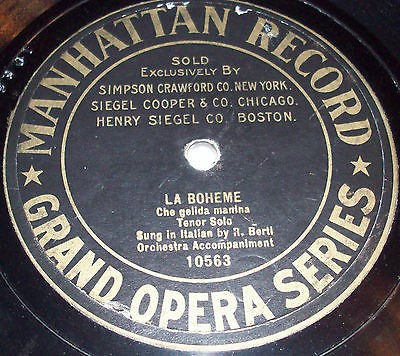 10563-1 La bohème (Puccini): Che gelida manina 10563, A5024
10565-1 Rigoletto (Verdi): La donna è mobile 10565, D4010, E124, E190
10566 Manon Lescaut (Puccini): Ah non v'avvicinate 10566, E191
10568-1 Lucia di Lammermoor (Donizetti): Fra poco a me 10568, A5013, D16254, D16542
10569 Il barbiere di Siviglia (Rossini): Ecco ridente 10569, D4001, E192
10570 Iris (Mascagni): Apri la tua finestra 10570
10571 Il barbiere di Siviglia (Rossini): Se il mio nome 10571, D4017, E193
10572-1 Luisa Miller (Verdi): Quando le sere 10572, A5025
10573-1 Carmen (Bizet): Il fior 10573, A5013, D16542
Homocord, Paris, April 1906
2101 Tosca (Puccini): Recondita armonia 2101
2102 Andrea Chénier (Giordano): Un dì all'azzurro spazio 2102
2103 Seconda mattinata (Tosti) 2103, Cabezas 2103
2106 Manon (Massenet): Chiudo gli occhi 2106, Cabezas 2106
2107 Aida (Verdi): Celeste Aida 2107, Disco Lisboa 2107
10563-1 La bohème (Puccini): Che gelida manina 10563, A5024
10565-1 Rigoletto (Verdi): La donna è mobile 10565, D4010, E124, E190
10566 Manon Lescaut (Puccini): Ah non v'avvicinate 10566, E191
10568-1 Lucia di Lammermoor (Donizetti): Fra poco a me 10568, A5013, D16254, D16542
10569 Il barbiere di Siviglia (Rossini): Ecco ridente 10569, D4001, E192
10570 Iris (Mascagni): Apri la tua finestra 10570
10571 Il barbiere di Siviglia (Rossini): Se il mio nome 10571, D4017, E193
10572-1 Luisa Miller (Verdi): Quando le sere 10572, A5025
10573-1 Carmen (Bizet): Il fior 10573, A5013, D16542
Homocord, Paris, April 1906
2101 Tosca (Puccini): Recondita armonia 2101
2102 Andrea Chénier (Giordano): Un dì all'azzurro spazio 2102
2103 Seconda mattinata (Tosti) 2103, Cabezas 2103
2106 Manon (Massenet): Chiudo gli occhi 2106, Cabezas 2106
2107 Aida (Verdi): Celeste Aida 2107, Disco Lisboa 2107
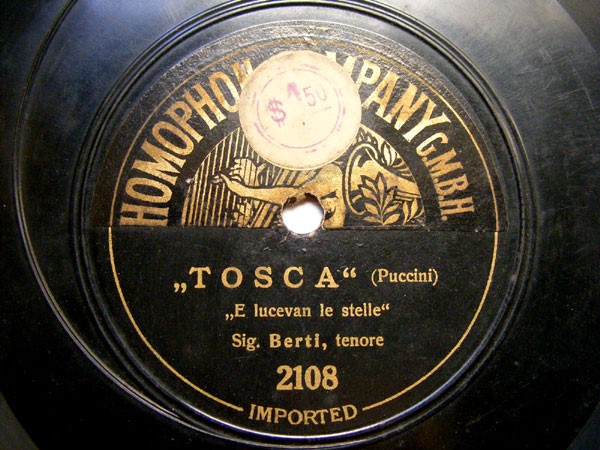 2108 Tosca (Puccini): E lucevan le stelle 2108
2109 Rigoletto (Verdi): La donna è mobile 2109
2110 Rigoletto (Verdi): Questa o quella 2110
2111 Il trovatore (Verdi): Di quella pira 2111, 12118 A, Rubin 100065
2112 Il trovatore (Verdi): Miserere 2112, Rubin 100065, Cabezas 2112
APGA, Paris, October 1906
35000 Tosca (Puccini): E lucevan le stelle 35000
35001 Tosca (Puccini): Recondita armonia 35001
35002 Rigoletto (Verdi): La donna è mobile 35002
35003 Rigoletto (Verdi): Ballata 35003
35005-B 'O sole mio (di Capua) 35005
35006 Mefistofele (Boito): Giunto sul passo estremo 35006, CIP35006
35007 Mefistofele (Boito): Dai campi, dai prati 35007, CIP35006
35008-A Fedora (Giordano): Amor ti vieta 35008
35009 Ballata (Mascagni) 35009
35010 Cavalleria rusticana (Mascagni): O Lola 35010
35011 Il trovatore (Verdi): Deserto sulla terra 35011
35012 Il trovatore (Verdi): Miserere 35012
35013 Aida (Verdi): Celeste Aida 35013
35014 Manon (Massenet): Il sogno 35014
Homocord, Paris, December 1907
8520 Cavalleria rusticana (Mascagni): O Lola, blanche fleur 8520, Cabezas 8520
8522 Pagliacci (Leoncavallo): Pauvre Paillasse 8522
8523 Manon (Massenet): En fermant les yeux 8523
Homocord, Paris, date uncertain (January 1908?)
8562 Pagliacci (Leoncavallo): Vesti la giubba 8562
8563 Hérodiade (Massenet): Ne pouvant réprimer 8563
8563-2 Hérodiade (Massenet): Ne pouvant réprimer 8563
8565 Aida (Verdi): Ô céleste Aida 8565
Homocord, Paris, February 1909
8510 Fedora (Giordano): Amor ti vieta 8510, Cabezas 8510
APGA, Paris, 1909
A 187 Panis angelicus (Franck) 35202
A 188 Pietà, Signore (Fétis) 35203
2108 Tosca (Puccini): E lucevan le stelle 2108
2109 Rigoletto (Verdi): La donna è mobile 2109
2110 Rigoletto (Verdi): Questa o quella 2110
2111 Il trovatore (Verdi): Di quella pira 2111, 12118 A, Rubin 100065
2112 Il trovatore (Verdi): Miserere 2112, Rubin 100065, Cabezas 2112
APGA, Paris, October 1906
35000 Tosca (Puccini): E lucevan le stelle 35000
35001 Tosca (Puccini): Recondita armonia 35001
35002 Rigoletto (Verdi): La donna è mobile 35002
35003 Rigoletto (Verdi): Ballata 35003
35005-B 'O sole mio (di Capua) 35005
35006 Mefistofele (Boito): Giunto sul passo estremo 35006, CIP35006
35007 Mefistofele (Boito): Dai campi, dai prati 35007, CIP35006
35008-A Fedora (Giordano): Amor ti vieta 35008
35009 Ballata (Mascagni) 35009
35010 Cavalleria rusticana (Mascagni): O Lola 35010
35011 Il trovatore (Verdi): Deserto sulla terra 35011
35012 Il trovatore (Verdi): Miserere 35012
35013 Aida (Verdi): Celeste Aida 35013
35014 Manon (Massenet): Il sogno 35014
Homocord, Paris, December 1907
8520 Cavalleria rusticana (Mascagni): O Lola, blanche fleur 8520, Cabezas 8520
8522 Pagliacci (Leoncavallo): Pauvre Paillasse 8522
8523 Manon (Massenet): En fermant les yeux 8523
Homocord, Paris, date uncertain (January 1908?)
8562 Pagliacci (Leoncavallo): Vesti la giubba 8562
8563 Hérodiade (Massenet): Ne pouvant réprimer 8563
8563-2 Hérodiade (Massenet): Ne pouvant réprimer 8563
8565 Aida (Verdi): Ô céleste Aida 8565
Homocord, Paris, February 1909
8510 Fedora (Giordano): Amor ti vieta 8510, Cabezas 8510
APGA, Paris, 1909
A 187 Panis angelicus (Franck) 35202
A 188 Pietà, Signore (Fétis) 35203
A big thankyou to Christian Torrent for the discography and the pictures; major updates
to the discography from Gesellschaft für historische Tonträger, Wien.
I would like to thank Richard J Venezia for the recordings (Trovatore, Africaine).
I would like to thank Tom Silverbörg for the recordings (Rigoletto, Pagliacci).
|




